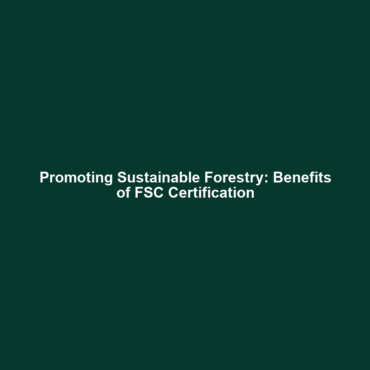Certification Schemes and Sustainable Forestry: Tackling Deforestation & Biodiversity Loss
Introduction:
Certification schemes, particularly the Forest Stewardship Council (FSC), play a crucial role in promoting sustainable forestry practices. With global deforestation rates threatening biodiversity and the integrity of ecosystems, initiatives like FSC provide guidelines and standards aimed at responsible forest management. These certification schemes not only address environmental concerns but also support social and economic benefits for communities dependent on forest resources. Understanding how these schemes function is essential in the broader context of combating deforestation and biodiversity loss, two intertwined challenges that our planet faces today.
Key Concepts
The major concepts surrounding certification schemes like FSC include:
- Sustainability Standards: Certification schemes establish rigorous sustainability standards that forest managers must adhere to. This includes maintaining forest health, conserving wildlife habitat, and respecting the rights of Indigenous peoples and local communities.
- Ecological Protection: FSC focuses on reducing the negative impacts of logging on biodiversity and promoting the regeneration of forest ecosystems.
- Economic Viability: By encouraging sustainable practices, these schemes help ensure long-term economic viability for forest-reliant communities.
In the context of deforestation and biodiversity loss, these principles guide responsible forest management and conservation efforts globally, stressing the importance of maintaining ecological integrity while meeting human needs.
Applications and Real-World Uses
Certification schemes like FSC are widely leveraged in various industries and their applications include:
- Timber and Paper Industries: Many companies opt for FSC-certified timber and paper products to ensure their sourcing is environmentally responsible.
- Consumer Goods: Brands looking to improve their sustainability profile utilize FSC certification to demonstrate their commitment to responsible sourcing.
- Conservation Initiatives: Organizations implement FSC guidelines as part of broader conservation strategies to protect threatened forests.
These applications highlight how FSC is used effectively in combating deforestation and biodiversity loss by promoting responsible forestry practices.
Current Challenges
Despite the positive impacts of certification schemes, several challenges persist:
- Awareness and Acceptance: Many consumers remain unaware of certification scheme benefits or are skeptical of their effectiveness.
- Compliance and Monitoring: Ensuring compliance with FSC standards can be difficult, especially in remote areas with limited oversight.
- Market Demand: Lack of market demand for certified products can hinder the financial viability of sustainable forestry initiatives.
These issues reflect the complex landscape of implementing certification schemes effectively in mitigating deforestation and biodiversity loss.
Future Research and Innovations
Looking ahead, there are promising innovations related to certification schemes like FSC:
- Technological Advancements: Emerging technologies, such as satellite monitoring and blockchain, are enhancing transparency and traceability in supply chains.
- Community Engagement: Future research is focusing on integrating local knowledge and participation to improve the effectiveness and acceptance of certification efforts.
- Policy Synergy: Innovations in policy integration with other environmental initiatives can increase support for sustainable forestry practices.
These developments point towards a future where certification schemes can more effectively combat deforestation and promote biodiversity conservation.
Conclusion
In conclusion, certification schemes like the Forest Stewardship Council (FSC) are vital in promoting sustainable forestry practices that help mitigate deforestation and biodiversity loss. Their principles foster responsible management of forest resources, benefitting both ecosystems and human communities. As awareness grows and innovations emerge, these schemes will likely play an increasingly pivotal role in global conservation efforts. For more information on sustainable practices and biodiversity conservation, visit our related articles on Sustainable Practices and Biodiversity Conservation.
